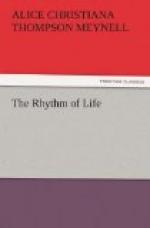As for the question of heredity and of individual responsibility which Dr. Oliver Wendell Holmes proposes in Elsie Venner, it is strange that a man whom it had sincerely disquieted should present it—not in its own insolubility but—in caricature. As though the secrets of the inherited body and soul needed to be heightened by a bit of burlesque physiology! It is in spite of our protest against the invention of Elsie’s horrible plight—a conception and invention which Dr. Oliver Wendell Holmes should feel to be essentially frivolous—that the serpent-maiden moves us deeply by her last ‘Good night,’ and by the gentle phrase that tells us ‘Elsie wept.’ But now, if Dr. Holmes shall succeed in proposing the question of separate responsibility so as to convince every civilised mind of his doubts, there will be curiously little change wrought thereby in the discipline of the world. For Dr. Holmes incidentally lets us know that he cherishes and values the instinct of intolerance and destructiveness in presence of the cruel, the self-loving, and the false. Negation of separate moral responsibility, when that negation is tempered by a working instinct of intolerance and destructiveness, will deal with the felon, after all, very much in the manner achieved by the present prevalent judicialness, unscientific though it may be. And to say this is to confess that Dr. Oliver Wendell Holmes has worked, through a number of books, to futile purpose. His books are justified by something quite apart from his purpose.
JAMES RUSSELL LOWELL
The United States have produced authors not a few; among some names not the most famous, perhaps, on the popular tongue, are two or three names of their poets; but they have hardly given to the world more than one man of letters—judicious, judicial, disinterested, patient, happy, temperate, delighted. The colonial days, with the ‘painful’ divines who brought the parish into the wilderness; the experimental period of ambition and attempts at a literature that should be young as the soil and much younger than the race; the civil-war years, with a literature that matched the self-conscious and inexpert heroism of the army;—none of these periods of the national life could fitly be represented by a man of letters. And though James Russell Lowell was the contemporary of the ‘transcendentalists,’ and a man of middle age when the South seceded, and though indeed his fame as a Yankee humourist is to be discerned through the smoke and the dust, through the gravity and the burlesque, of the war, clear upon the other side, yet he was virtually the child of national leisure, of moderation and education, an American of the seventies and onwards. He represented the little-recognised fact that in ripeness, not in rawness, consists the excellence of Americans—an excellence they must be content to share with contemporary nations, however much it may cost them to abandon




